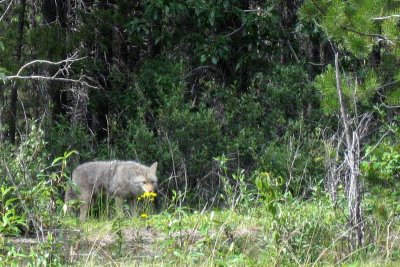 This wonderful old grey fellow was across the road, but my husband managed to get a slightly blurry photo of him. He was eating dandelions.
This wonderful old grey fellow was across the road, but my husband managed to get a slightly blurry photo of him. He was eating dandelions.June 14 - Golden, BC. We visited the Northern Lights Wildlife Wolf Centre. Its mission:
Northern Lights Wildlife Wolf Centre promotes wolf and bear conservation throughout the natural environment. We value the role these carnivores play in nature. We strive to provide a one-of-a-kind, quality experience to the public as we support conservation through education.The staff of the centre are extremely knowledgeable. Their goal is to increase our understanding of and respect for wolves and to encourage their protection. Our guide, who turned out to have been our server at our motel restaurant the night before, has a degree in environmental studies with a specialty in wildlife from the University of Toronto. She interned at the centre two summers ago.
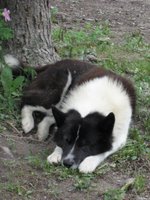 The Centre has Karelian Bear Dogs they use to shepherd bears in a safe and humane way from places where they could endanger or be endangered by humans back to a habitat where they can be safe.
The Centre has Karelian Bear Dogs they use to shepherd bears in a safe and humane way from places where they could endanger or be endangered by humans back to a habitat where they can be safe.If you're a resident of British Columbia, you might consider signing petitions to legalize bear shepherding of "problem bears." Non-residents of BC are encouraged to sign letters of protest, provided on the site.
At the Golden centre, there are four wolves. None of these wolves can be introduced into the wild. You can meet these wolves on the centre's web site. Quotes are from the centre's web site.
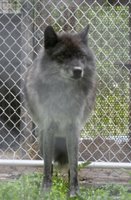 Tuk
TukTuk is a male Grey Wolf, born in May 1999, and his colouring is referred to as the "black phase" of the Grey Wolf. He and his sister, Maya, were adopted at the age of 6 weeks. Tuk now occupies the Beta position in our wolf pack. He is very shy around visitors, often hiding, but is loving and respectful towards his pack. He weighs about 90 lb (40 kg), which is average for a male wolf.
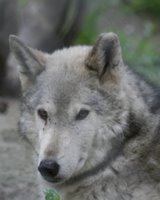 Aspen
AspenAspen is a Wolfdog: 25% Husky and 75% Grey Wolf. She was born in April of 1998. The Blacks spent that whole first year observing Aspen's behavior, and working with her. Aspen was one year old when Tuk and Maya arrived as pups, and she took it upon herself to be the boss and to teach them the ropes. She was able to keep the rank of Beta until the spring of 2004, when she and Maya began fighting. She weighs about 65 lb (30 kg), which is average for a female wolf.
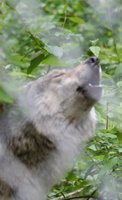 Our official opinion regarding Wolfdogs as pets: don't do it. "Hybrids" make unsuitable pets and we do not endorse their breeding, nor their sale as pets. By crossing a domestic pet with a wild animal (with strong predatory instincts and sense of hierarchy), the resulting mix of traits is unpredictable, and often tragic for the animal itself.
Our official opinion regarding Wolfdogs as pets: don't do it. "Hybrids" make unsuitable pets and we do not endorse their breeding, nor their sale as pets. By crossing a domestic pet with a wild animal (with strong predatory instincts and sense of hierarchy), the resulting mix of traits is unpredictable, and often tragic for the animal itself.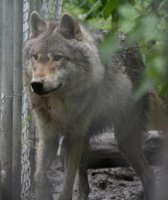 Wiley
WileyWiley, 100% Grey Wolf, was born May 2002. He was only nine days old when we picked him up, weighing only 1.5 lb (less than 1kg). The pack accepted Wiley right away, and Maya even dug a den for him. Within a week of his arrival, he was teething and playing with everyone. His fur was dark brown as a pup, which has since turned into the mottled grey-brown that most people picture as a "grey wolf". Today, Wiley weighs a healthy 110 lb (50 kg), and is a friendly and mischievous Ambassador Wolf.
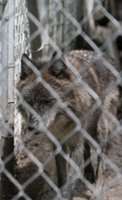 Maya
MayaMaya is a female Grey Wolf, from the same litter as Tuk (born May 1999). She is also the black phase of the Grey Wolf. Maya has always been the most submissive of our pack, and continues to be despite the aggression she displays towards Aspen. These days, she is even submitting to Wiley, who is three years her junior. Maya shows concern and affection towards the younger members, and takes care of everyone, especially Moab. She weighs about 65 lb (30 kg).
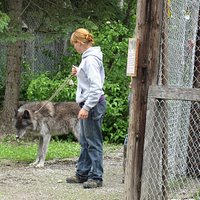 The wolves are taken in pairs on hikes at least twice a week. Visitors may hike with them and take photos. Each wolf leaves the centre on leash and is taken by the owners of the centre by jeep to a safe trail in the wilderness. They are then released and run free. They always return to the start of the trail to be picked up and taken home.
The wolves are taken in pairs on hikes at least twice a week. Visitors may hike with them and take photos. Each wolf leaves the centre on leash and is taken by the owners of the centre by jeep to a safe trail in the wilderness. They are then released and run free. They always return to the start of the trail to be picked up and taken home.These wolves must stay in captivity. Their cages are large and they have places to run, to sleep and to hide if they wish. They are very well treated and deeply respected at the centre.
The centre's web site is well worth looking at. In addition to the petitions for legalizing bear shepherding, there are also links to sites of organizations working to protect wolves through legislation that requires a license to hunt wolves, a bag limit, and a closed season for hunting and trapping wolves.

3 comments:
This is fascinating - I learnt so much - shepherding bears - what a wonderful solution. Wolves are beautiful animals are they not? To have sen these guys must've been a really amazing experience.
To come fairly close to a wolf is an amazing thing and to hear them singing at nightfall is something else - eery, compelling and timeless. These wolves (and your photos) are superb.
I too find this fascinating. I really appreciate your posts. :-)
Post a Comment